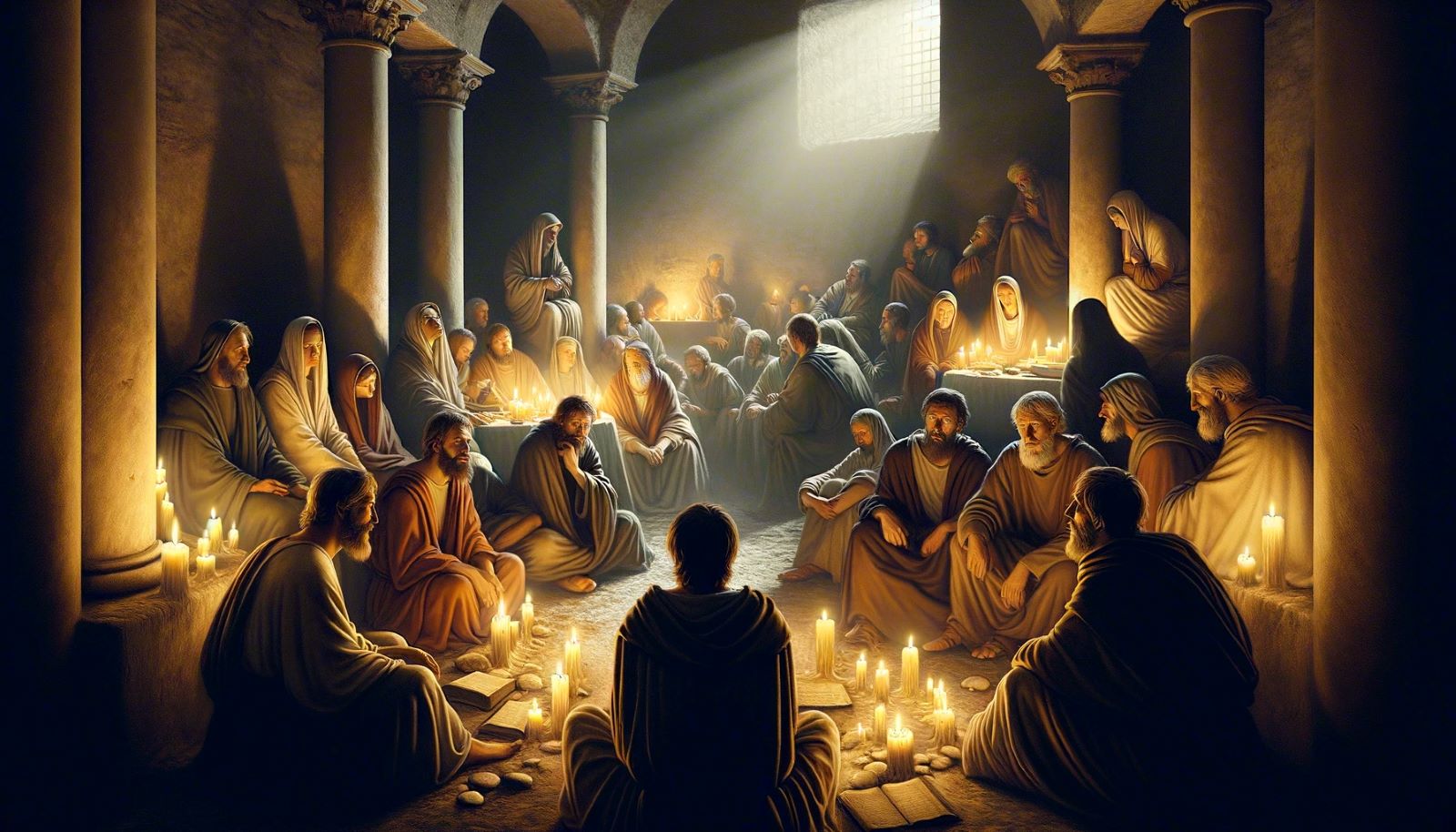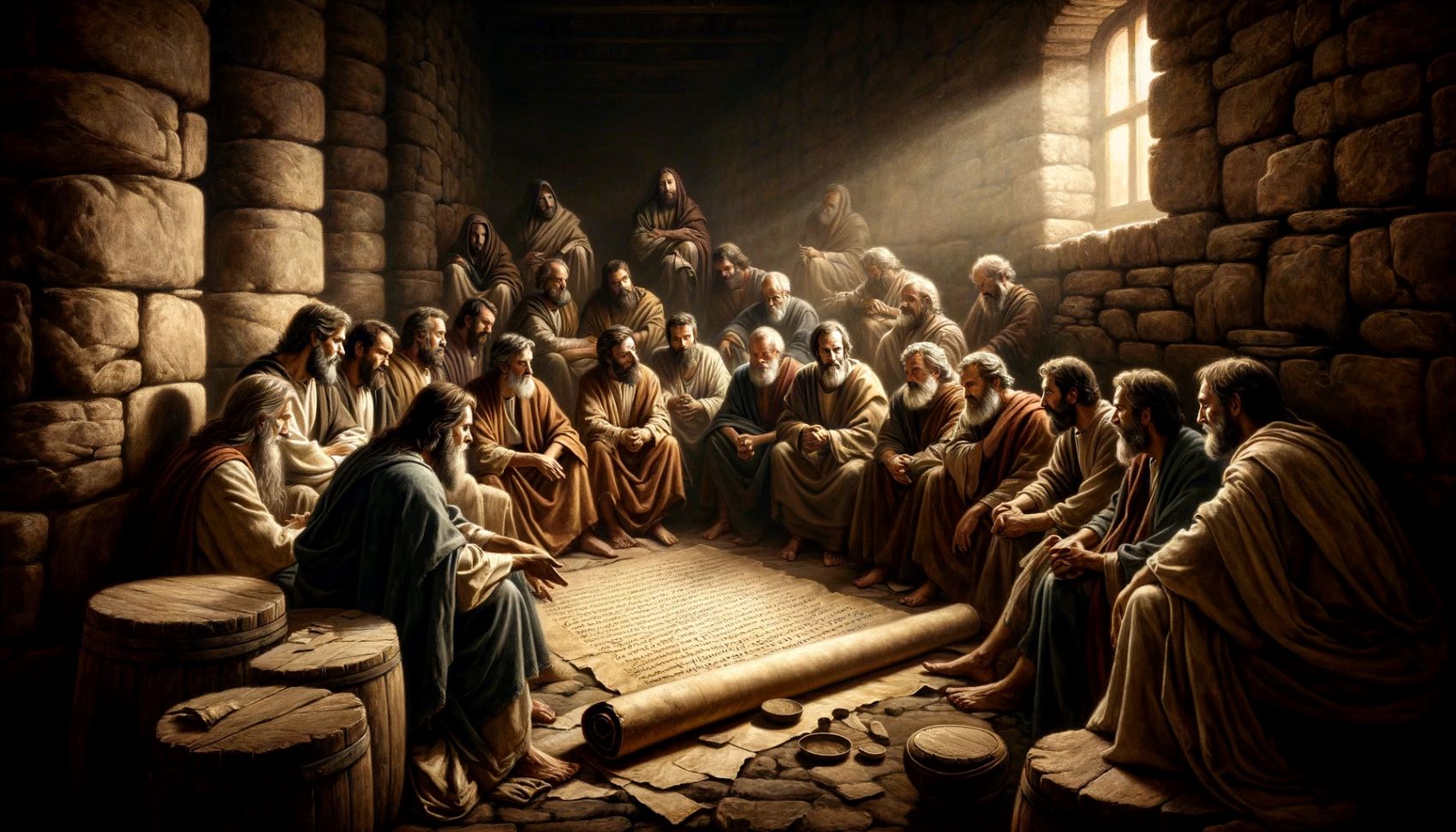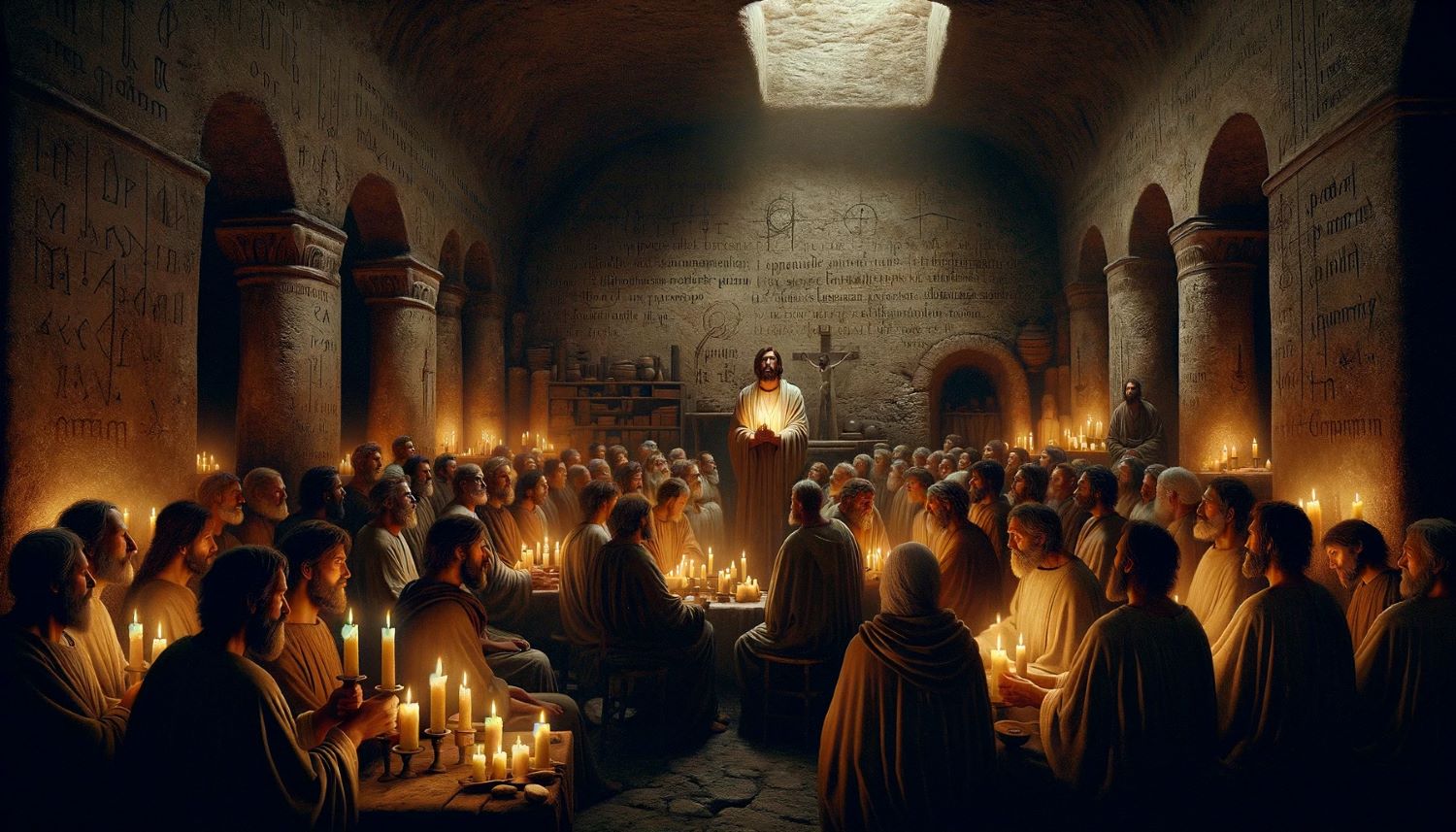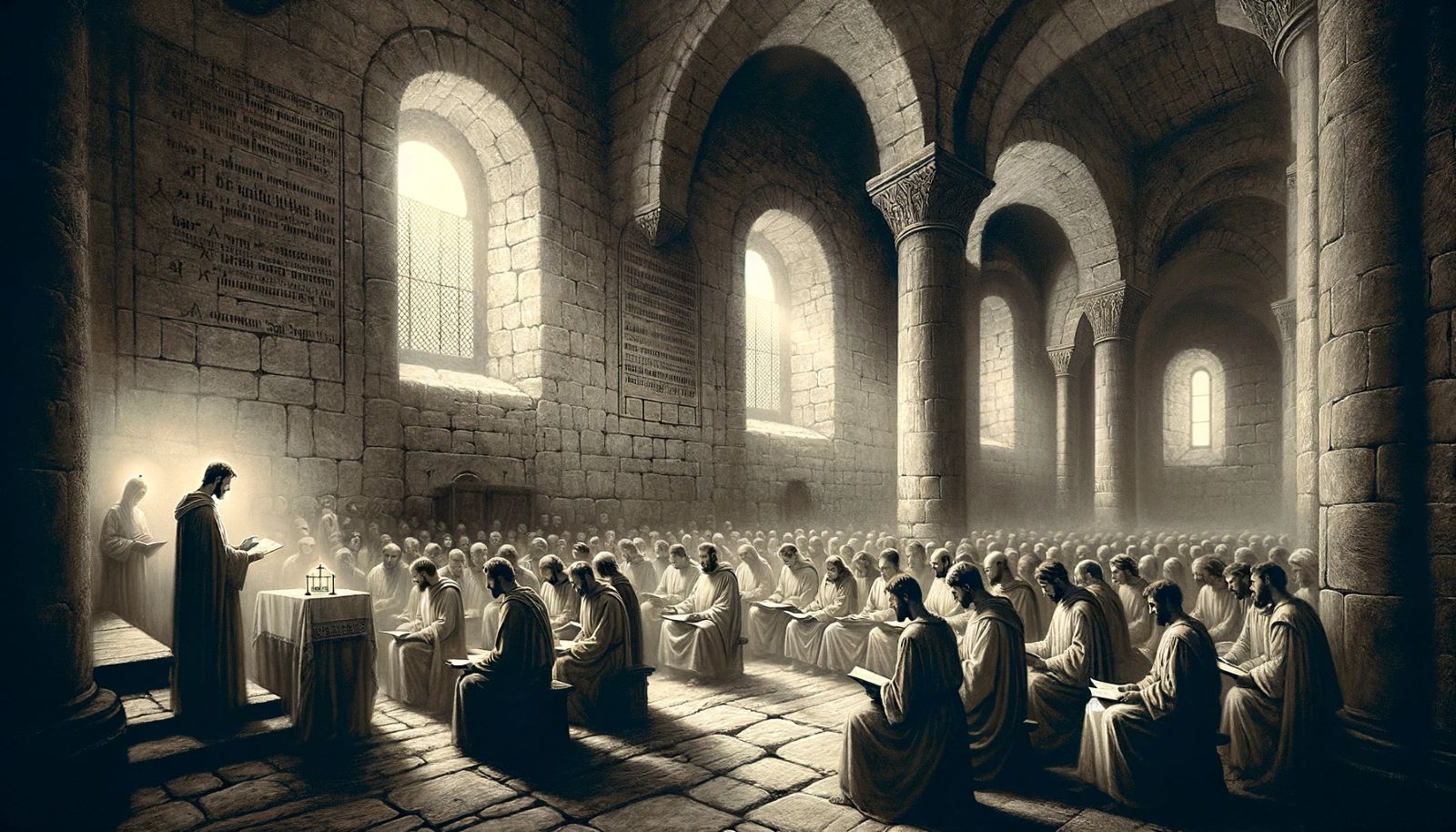Home>Bible Facts>What Are The Words Of The Apostles Creed


Bible Facts
What Are The Words Of The Apostles Creed
Published: February 23, 2024
Peter Smith, Editorial Director at Christian.net, combines deep insights into faith, politics, and culture to lead content creation that resonates widely. Awarded for his contributions to religious discourse, he previously headed a major organization for religious communicators, enhancing dialogue on faith's societal impacts.
Discover the essential Bible facts and teachings encapsulated in the Apostles' Creed. Explore the foundational beliefs of Christianity with the words of the Apostles Creed.
(Many of the links in this article redirect to a specific reviewed product. Your purchase of these products through affiliate links helps to generate commission for Christian.net, at no extra cost. Learn more)
Table of Contents
Introduction
The Apostles Creed stands as a timeless testament to the foundational beliefs of Christianity. Its words echo through the centuries, resonating with the hearts of believers and serving as a unifying declaration of faith. This ancient creed encapsulates the essential tenets of Christian doctrine, offering a succinct yet profound expression of the core beliefs held by millions around the world.
As we delve into the words of the Apostles Creed, we embark on a journey through the bedrock of Christian faith. This creed, with its roots tracing back to the early centuries of the Church, holds a place of reverence and significance within Christian tradition. It serves as a beacon of unity, transcending denominational boundaries and uniting believers under the banner of shared beliefs.
The Apostles Creed is not merely a collection of words; it is a living testament to the enduring truths that have shaped the Christian faith. Its concise yet comprehensive structure encapsulates the beliefs in the triune nature of God, the redemptive work of Jesus Christ, and the hope of eternal life. These foundational truths, articulated in the creed, serve as a source of strength, comfort, and assurance for countless individuals navigating the complexities of life.
In the pages that follow, we will embark on a journey of exploration and understanding, unraveling the significance and impact of the Apostles Creed. Through a line-by-line analysis, we will uncover the profound depth of meaning encapsulated within each phrase, shedding light on the rich tapestry of Christian theology woven into this ancient confession of faith. Furthermore, we will delve into the historical context of the creed, tracing its origins and examining its enduring relevance in contemporary Christian worship.
Join us as we embark on a captivating odyssey through the words of the Apostles Creed, delving into the heart of Christian belief and discovering the enduring power of this ancient declaration of faith.
Read more: What Is The Apostles Creed
The Apostles Creed: An Overview
The Apostles Creed stands as a foundational statement of faith within the Christian tradition, encapsulating the core beliefs that have shaped the identity of believers for centuries. This ancient creed, with its origins shrouded in the mists of early Christianity, serves as a concise yet comprehensive summary of essential Christian doctrines. Composed of succinct affirmations, the creed articulates the beliefs in the triune nature of God, the redemptive work of Jesus Christ, and the hope of eternal life.
At its core, the Apostles Creed serves as a unifying symbol, transcending denominational differences and uniting believers under a shared confession of faith. Its widespread use in liturgical settings and personal devotions underscores its enduring significance within the global Christian community. The creed's concise structure enables it to be easily memorized and recited, making it accessible to individuals across diverse cultural and linguistic backgrounds.
The Apostles Creed consists of three distinct sections, each affirming essential aspects of Christian belief. The first section focuses on the beliefs concerning God the Father, the creator of heaven and earth. The second section centers on the person and redemptive work of Jesus Christ, affirming key aspects of His incarnation, crucifixion, death, and resurrection. The final section articulates the beliefs in the Holy Spirit, the universal church, the forgiveness of sins, the resurrection of the body, and the life everlasting.
This creed's enduring relevance lies in its ability to encapsulate the foundational truths of the Christian faith in a succinct and accessible manner. It serves as a touchstone for believers, providing a framework for understanding and articulating their faith. Furthermore, the Apostles Creed serves as a bridge connecting contemporary believers to the early Christian community, fostering a sense of continuity and shared heritage across the expanse of Christian history.
In essence, the Apostles Creed stands as a timeless declaration of faith, embodying the enduring truths that have shaped the Christian faith throughout the ages. Its concise yet profound articulation of essential doctrines continues to resonate with believers, serving as a source of unity, strength, and inspiration within the global Christian community.
Line-by-Line Analysis of the Apostles Creed
The Apostles Creed, revered as a foundational statement of Christian faith, unfolds as a succinct yet profound declaration of essential beliefs. Each line of this ancient creed serves as a building block, contributing to the rich tapestry of Christian theology. Let's embark on a journey of exploration, unraveling the depth of meaning encapsulated within each phrase.
"I believe in God, the Father almighty, creator of heaven and earth."
This opening statement lays the groundwork for the creed, affirming the belief in the existence of God as the supreme authority and the creator of the cosmos. It encapsulates the foundational doctrine of monotheism, acknowledging God as the sovereign ruler and the source of all creation.
"And in Jesus Christ, His only Son, our Lord."
This line focuses on the person and identity of Jesus Christ, acknowledging Him as the unique and divine Son of God. It emphasizes the lordship of Christ, affirming His authority and sovereignty over all aspects of life.
Read more: What Religions Say The Apostles Creed
"Who was conceived by the Holy Spirit, born of the Virgin Mary."
Here, the creed affirms the miraculous nature of Christ's conception, emphasizing His divine origin through the agency of the Holy Spirit. The reference to the Virgin Mary underscores the humanity of Christ, while the role of the Holy Spirit highlights His divine nature.
"Suffered under Pontius Pilate, was crucified, died, and was buried."
This line delves into the historical reality of Christ's suffering, crucifixion, and death, grounding the Christian faith in the events of Jesus' earthly life. It serves as a poignant reminder of the sacrificial nature of Christ's redemptive work on the cross.
"He descended to the dead. On the third day, He rose again."
This segment encapsulates the profound truth of Christ's victory over death, affirming the resurrection as a central tenet of Christian faith. It underscores the transformative power of Christ's triumph over the grave, offering hope and assurance to believers.
"He ascended into heaven and is seated at the right hand of the Father."
This line emphasizes the exaltation and glorification of Christ, highlighting His current position of authority and intercession on behalf of believers. It underscores the ongoing relevance of Christ's redemptive work in the present age.
Read more: What Is The Apostles Creed Prayer?
"He will come again to judge the living and the dead."
The final affirmation of the creed points to the future return of Christ, underscoring the belief in His ultimate authority as the righteous judge. It serves as a reminder of the eschatological hope that permeates the Christian faith, shaping believers' perspectives on the culmination of history.
In essence, the Apostles Creed, through its line-by-line analysis, offers a comprehensive framework for understanding and articulating the foundational beliefs of Christianity. Each phrase contributes to the cohesive narrative of Christian faith, weaving together the divine revelation and historical reality that underpin the Christian worldview.
The Historical Significance of the Apostles Creed
The historical significance of the Apostles Creed is deeply rooted in the early centuries of Christianity, tracing its origins to the formative period of the Church. While the exact dating of its composition remains a subject of scholarly debate, the creed's emergence can be situated within the context of the nascent Christian community grappling with theological controversies and the need for a concise statement of faith.
During the first few centuries of the Church, doctrinal disputes and divergent theological perspectives proliferated, necessitating a unifying declaration of essential beliefs. The Apostles Creed, with its succinct articulation of core Christian doctrines, served as a foundational response to these theological challenges. Its formulation was shaped by the collective wisdom of early Christian communities, drawing upon the teachings of the apostles and the apostolic tradition that permeated the fabric of early Christianity.
The creed's historical significance is further underscored by its role in the early Christian catechetical process. As the Church expanded and encountered diverse cultural contexts, the need for a standardized confession of faith became increasingly apparent. The Apostles Creed, with its concise yet comprehensive structure, provided a framework for instructing new converts and grounding them in the foundational tenets of Christian belief. This pedagogical function contributed to the creed's widespread dissemination and enduring influence across diverse geographical regions.
Furthermore, the historical significance of the Apostles Creed is intertwined with its role in shaping the trajectory of Christian orthodoxy. As theological controversies unfolded and ecumenical councils convened to address doctrinal disputes, the creed emerged as a touchstone for evaluating and affirming essential Christian beliefs. Its status as a symbol of unity and orthodoxy within the early Church underscored its historical significance as a unifying force amidst theological diversity.
The creed's historical journey, from its early formulations to its enduring presence in contemporary Christian worship, reflects its resilience and adaptability across the expanse of Christian history. Its enduring significance lies in its ability to transcend temporal and cultural boundaries, serving as a timeless testament to the enduring truths that have shaped the Christian faith.
In essence, the historical significance of the Apostles Creed resides in its formative role within the early Christian community, its pedagogical function in catechesis, and its enduring influence as a symbol of Christian unity and orthodoxy. This ancient declaration of faith continues to resonate with believers, bearing witness to the enduring legacy of Christian tradition and the foundational beliefs that have stood the test of time.
The Role of the Apostles Creed in Christian Worship
The Apostles Creed holds a central and revered position within Christian worship, serving as a unifying declaration of faith and a foundational element of liturgical practice. Its role in Christian worship extends beyond mere recitation; it embodies a multifaceted significance that enriches the worship experience and fosters a sense of communal identity and theological grounding.
Unifying Confession of Faith
In the context of corporate worship, the recitation of the Apostles Creed serves as a unifying confession of faith, bringing together believers from diverse backgrounds under the banner of shared beliefs. As the congregation collectively affirms the creed, it fosters a sense of unity and solidarity, transcending denominational differences and emphasizing the essential doctrines that bind believers together. This communal declaration of faith reinforces the interconnectedness of the body of Christ, affirming the foundational truths that underpin Christian identity.
Read more: What Is The Original Apostles Creed?
Doctrinal Foundation
The creed's inclusion in liturgical worship underscores its role as a doctrinal foundation, grounding the worship experience in the core beliefs of the Christian faith. By articulating essential doctrines related to the triune nature of God, the redemptive work of Jesus Christ, and the hope of eternal life, the creed provides a theological framework that shapes the worshipers' understanding of God and His redemptive purposes. It serves as a touchstone for doctrinal fidelity, guiding the worshiping community in embracing and proclaiming the timeless truths encapsulated within its concise affirmations.
Historical Continuity
Incorporating the Apostles Creed into Christian worship fosters a sense of historical continuity, connecting contemporary believers to the rich tapestry of Christian tradition. As worshipers recite the same words that have echoed through the centuries, they participate in a sacred continuity that transcends temporal boundaries. This historical rootedness serves to remind worshipers of their place within the broader narrative of Christian history, reinforcing a sense of shared heritage and perpetuating the enduring legacy of the Christian faith.
Educational Tool
Beyond its role as a declaration of faith, the Apostles Creed functions as an educational tool within the context of worship. Its repetitive recitation in liturgical settings provides an opportunity for believers, including children and newcomers to the faith, to internalize and familiarize themselves with the foundational beliefs of Christianity. This pedagogical function contributes to the spiritual formation of individuals within the worshipping community, nurturing a deeper understanding of Christian doctrine and fostering a sense of theological literacy.
In essence, the Apostles Creed occupies a pivotal role in Christian worship, serving as a unifying confession of faith, a doctrinal foundation, a link to historical continuity, and an educational tool. Its incorporation into liturgical practice enriches the worship experience, fostering a deeper sense of communal identity and grounding worshipers in the enduring truths that have shaped the Christian faith.
Conclusion
In conclusion, the Apostles Creed stands as a timeless declaration of faith, embodying the enduring truths that have shaped the Christian faith throughout the ages. Its concise yet profound articulation of essential doctrines continues to resonate with believers, serving as a source of unity, strength, and inspiration within the global Christian community. The creed's historical significance, rooted in the formative period of the Church, underscores its resilience and adaptability across diverse cultural and theological landscapes. Its role in Christian worship as a unifying confession of faith, a doctrinal foundation, a link to historical continuity, and an educational tool enriches the worship experience, fostering a deeper sense of communal identity and grounding worshipers in the enduring truths that have shaped the Christian faith.
The line-by-line analysis of the Apostles Creed reveals a comprehensive framework for understanding and articulating the foundational beliefs of Christianity. Each phrase contributes to the cohesive narrative of Christian faith, weaving together the divine revelation and historical reality that underpin the Christian worldview. Furthermore, the creed's enduring relevance lies in its ability to encapsulate the foundational truths of the Christian faith in a succinct and accessible manner, providing a touchstone for believers and fostering a sense of continuity and shared heritage across the expanse of Christian history.
As we reflect on the words of the Apostles Creed, we are reminded of the enduring power of these ancient declarations of faith. They transcend time and space, uniting believers across generations and continents under a shared confession of essential beliefs. The Apostles Creed serves as a testament to the enduring legacy of Christian tradition, embodying the foundational truths that have stood the test of time. Its resonance within the hearts of believers bears witness to the enduring impact of these ancient words, offering a source of strength, comfort, and assurance in the midst of life's complexities.
In essence, the Apostles Creed remains a beacon of unity, a testament to the enduring truths of the Christian faith, and a timeless declaration of belief. Its words echo through the corridors of time, resonating with the hearts of believers and serving as a unifying symbol of faith for generations past, present, and future.












